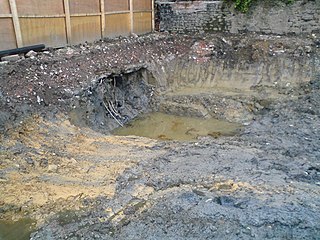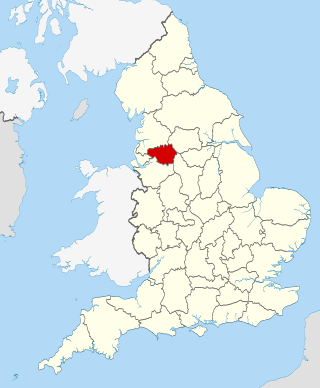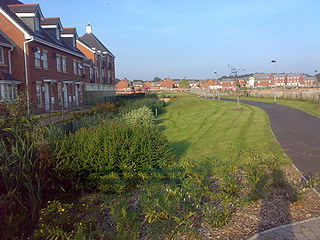Related Research Articles

The diplomatic foreign relations of the United Kingdom are conducted by the Foreign, Commonwealth and Development Office, headed by the Foreign Secretary. The prime minister and numerous other agencies play a role in setting policy, and many institutions and businesses have a voice and a role.

The mayor of London is the chief executive of the Greater London Authority. The role was created in 2000 after the Greater London devolution referendum in 1998, and was the first directly elected mayor in the United Kingdom.

Brownfield is land that is abandoned or underutilized due to pollution from industrial use. The specific definition of brownfield land varies and is decided by policy makers and/or land developers within different countries. The main difference in definitions of whether a piece of land is considered a brownfield or not depends on the presence or absence of pollution. Overall, brownfield land is a site previously developed for industrial or commercial purposes and thus requires further development before reuse.

The Department for Environment, Food and Rural Affairs (Defra) is a ministerial department of the Government of the United Kingdom. It is responsible for environmental protection, food production and standards, agriculture, fisheries and rural communities in the entire United Kingdom. Concordats set out agreed frameworks for co operation, between it and the Scottish Government, Welsh Government and Northern Ireland Executive, which have devolved responsibilities for these matters in their respective nations.
The Environment Agency (EA) is a non-departmental public body, established in 1996 and sponsored by the United Kingdom government's Department for Environment, Food and Rural Affairs, with responsibilities relating to the protection and enhancement of the environment in England.

Extended producer responsibility (EPR) is a strategy to add all of the estimated environmental costs associated with a product throughout the product life cycle to the market price of that product, contemporarily mainly applied in the field of waste management. Such societal costs are typically externalities to market mechanisms, with a common example being the impact of cars.

Zero waste, or waste minimization, is a set of principles focused on waste prevention that encourages redesigning resource life cycles so that all products are repurposed and/or reused. The goal of the movement is to avoid sending trash to landfills, incinerators, oceans, or any other part of the environment. Currently 9% of global plastic is recycled. In a zero waste system, all materials are reused until the optimum level of consumption is reached.

The Association of Greater Manchester Authorities was the local government association for Greater Manchester, a metropolitan county in North West England. Its creation followed the abolition of the Greater Manchester County Councilbeing established in 1986 as a governmental organisation to represent the ten district councils of Greater Manchester. AGMA was later superseded by the Greater Manchester Combined Authority, the first authority of this new type in the United Kingdom, on 1 April 2011.
Planning Policy Statements (PPS) were UK government statements of national policy and principles towards certain aspects of the town planning framework. In recent years they only applied to England. However, they still exist within the Northern Irish System.
Nuclear power in the United Kingdom generated 16.1% of the country's electricity in 2020. As of August 2022, the UK has 9 operational nuclear reactors at five locations, producing 5.9 GWe. It also has nuclear reprocessing plants at Sellafield and the Tails Management Facility (TMF) operated by Urenco in Capenhurst.

Waste Management, Inc., doing business as WM, is a waste management, comprehensive waste, and environmental services company operating in North America. Founded in 1968, the company is headquartered in the Bank of America Tower in Houston, Texas.

A local development framework is the spatial planning strategy introduced in England and Wales by the Planning and Compulsory Purchase Act 2004 and given detail in Planning Policy Statements 12. In most parts of the two countries, maintaining the framework is the responsibility of English district councils and Welsh principal area councils.
The Health and Social Care Select Committee is a Departmental Select Committee of the British House of Commons, the lower house of the United Kingdom Parliament. Its remit is to examine the policy, administration and expenditure of the Department of Health and Social Care (DHSC) and its associated agencies and public bodies. The Clerks of the Committee are Previn Desai and Joanna Dodd.

In 2015, 43.5% of the United Kingdom's municipal waste was recycled, composted or broken down by anaerobic digestion. The majority of recycling undertaken in the United Kingdom is done by statutory authorities, although commercial and industrial waste is chiefly processed by private companies. Local Authorities are responsible for the collection of municipal waste and operate contracts which are usually kerbside collection schemes. The Household Waste Recycling Act 2003 required local authorities in England to provide every household with a separate collection of at least two types of recyclable materials by 2010. Recycling policy is devolved to the administrations of Scotland, Northern Ireland and Wales who set their own targets, but all statistics are reported to Eurostat.

The Coal Authority is a non-departmental public body of the United Kingdom government sponsored by the Department for Energy Security and Net Zero (DESNZ). On behalf of the country, it owns the vast majority of unworked coal in Great Britain, as well as former coal mines, and undertakes a range of functions including:

The Planning Act 2008 is an Act of the Parliament of the United Kingdom intended to speed up the process for approving major new infrastructure projects such as airports, roads, harbours, energy facilities such as nuclear power and waste facilities. This was felt to be necessary after the 8-year approval process for Heathrow Terminal 5. Along with the Climate Change Bill and the Energy Bill this bill was considered by the Brown administration to be one of the "three legislative pillars of the Government's strategy to secure long-term prosperity and quality of life for all". The Infrastructure Planning Commission has since been abolished and replaced with the Planning Inspectorate as of 31 March 2012.

It is estimated that 290 million tonnes of waste was produced in the United Kingdom in 2008 but volumes are declining. In 2012 municipal solid waste generation was almost 30 million tonnes, according to Waste Atlas Platform.

Bright Blue is an independent centre-right think tank and pressure group with a mission statement of defending and improving liberal society, based in the United Kingdom. Founded in 2014 by British thinker Ryan Shorthouse, Bright Blue aims to "defend and champion liberal, open, democratic and meritocratic values, institutions and policies." Bright Blue is a membership-based think tank, with membership open to anyone who identifies as a liberal conservative. It publishes political research, recommends and vets public policy, and hosts political events.

The Mayor of Greater Manchester is the directly elected mayor of Greater Manchester, responsible for strategic governance in the region that includes health, transport, housing, strategic planning, waste management, policing, the Greater Manchester Fire and Rescue Service and skills. The creation of the Mayor of Greater Manchester was agreed between the then Chancellor of the Exchequer, George Osborne, and Greater Manchester's 10 district council leaders. As well as having specific powers, the mayor chairs the Greater Manchester Combined Authority, also assuming the powers of the Greater Manchester Police and Crime Commissioner.
Sustainable Materials Management is a systemic approach to using and reusing materials more productively over their entire lifecycles. It represents a change in how a society thinks about the use of natural resources and environmental protection. By looking at a product's entire lifecycle new opportunities can be found to reduce environmental impacts, conserve resources, and reduce costs.
References
- ↑ "[Withdrawn] Planning for sustainable waste management: planning policy statement 10". GOV.UK. 16 October 2014. Retrieved 3 June 2024.
- ↑ "Waste Management Plan for England 2021". GOV.UK. Retrieved 3 June 2024.